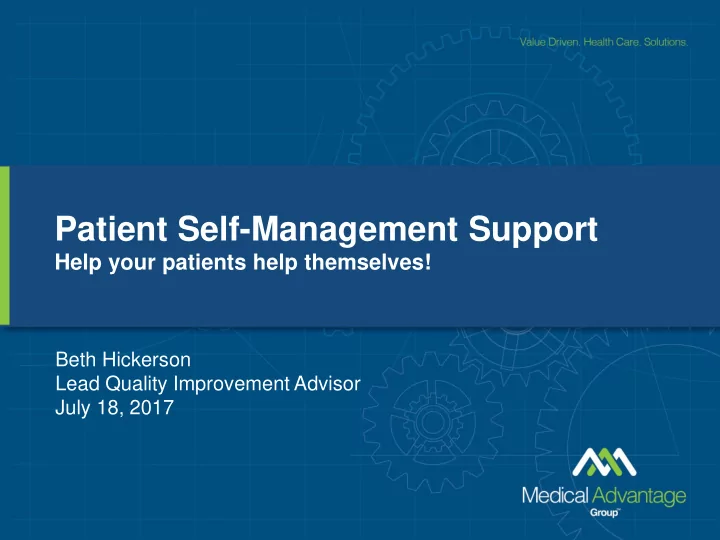

Patient Self-Management Support Help your patients help themselves! Beth Hickerson Lead Quality Improvement Advisor July 18, 2017
SELF-MANAGEMENT SUPPORT What and Why?
What is Self-Management Support Self - management support is: the care and encouragement provided to people with chronic conditions and their families to help them understand their central role in managing their illness, make informed decisions about care, and engage in healthy behaviors. Value Driven.Health Care. Solutions. 3
How does it relate to GLPTN? Milestone 4 of the Practice Assessment Tool Practice can demonstrate that it encourages patients and families to collaborate in goal setting, decision making, and self-management. Phase Score Description: 0 = Not Yet 1 = Getting Started 2 = Implementing, partially operating 3 = Functioning, performing Value Driven.Health Care. Solutions. 4
Milestone 4 Goals Phase 2 Goal Practice is training its staff in shared decision making approaches and developing ways to consistently document patient involvement in goal setting, decision making, and self-management. Phase 4 Goal Practice can demonstrate that patients and families are collaborating in goal setting, decision making and self- management (e.g. shared care plans, documentation of self-management goals, compacts, etc. Value Driven.Health Care. Solutions. 5
Why is self-management support important? Better outcomes Higher quality of life Lower costs Value Driven.Health Care. Solutions. 6
Shifting Mindsets – Start with your own Patient success = Practice success Your patients are teammates, not opponents Changing behavior is a marathon not a sprint Logical solutions don’t solve emotional problems Assume positive intent Value Driven.Health Care. Solutions. 7
Why don’t patients do more for themselves? Passive wellness mindset Feel overwhelmed with options Don’t believe they can change Over-committed/No time or energy Consequences are theoretical, not real Rebellion Just don’t know better Value Driven.Health Care. Solutions. 8
Preach vs Teach Passive wellness mindset Engage Feel overwhelmed with options Simplify Don’t believe they can change Encourage Over-committed/No time or Prioritize energy Consequences are theoretical, Visualize not real Rebellion Ask Just don’t know better Educate Value Driven.Health Care. Solutions. 9
SELF-MANAGEMENT SUPPORT How?
Educate Use evidence-based decision aids to inform patients of risks and benefits of options in preference-sensitive conditions • Web search for “Decision Aids {condition}” Routinely share test results, along with appropriate education about implications of those results Provide condition-specific chronic disease self- management support programs or coaching or link to those programs in the community • YMCA Diabetes Prevention Program • Kidney Smart classes Value Driven.Health Care. Solutions. 11
Educate Educate patients and families on health care transformation using appropriate language so they can be active, informed change agents • Avoid jargon! • “The Patient-Centered Medical Home is responsible for providing for all of your health care needs or arranging care with other health care providers.” Value Driven.Health Care. Solutions. 12
Engage Provide a pre-visit development of a shared visit agenda with the patient • Ask Me 3 Use tools to assist patients in assessing their need for support of self-management • Patient Activation Measure • How’s My Health Value Driven.Health Care. Solutions. 13
Engage Incorporate evidence-based techniques to promote self-management into usual care, using techniques such as • Teach Back https://www.youtube.com/watch?v=bzpJJYF_tKY • Goal setting with structured follow-up https://www.youtube.com/watch?v=nP1blg7qc9o • Action Planning https://www.youtube.com/watch?v=bvWkle1pNTk • Motivational Interviewing https://www.youtube.com/watch?v=IIIWlhrjLpc Value Driven.Health Care. Solutions. 14
Engage Engage patients, family and caregivers in developing a plan of care and prioritizing their goals for action, documented in the EHR • http://www.aafp.org/fpm/2015/0100/fpm20150100p7- rt1.pdf Ensure patient leaves the office with care plan in hand Value Driven.Health Care. Solutions. 15
Support Provide peer-led support for self-management Web search “chcf.org Building Peer Support Programs” Provide group visits for common chronic conditions http://www.aafp.org/fpm/2006/0100/p37.html Provide coaching between visits with follow-up on care plan and goals https://www.youtube.com/watch?v=nP1blg7qc9o Value Driven.Health Care. Solutions. 16
Team Approach Train staff in self-management goal setting Train staff in motivational interviewing approaches Standardize action planning and plan follow-up process so entire team can participate http://www.improvingchroniccare.org/downloads/selfma nagement_support_toolkit_for_clinicians_2012_update .pdf Value Driven.Health Care. Solutions. 17
QUESTIONS? COMMENTS?
Contacts Beth Hickerson, Lead Quality Improvement Advisor • bhickerson@medadvgrp.com Angela Hale, Quality Improvement Advisor • ahale@medadvgrp.com Kelley Montague, Clinical Quality Improvement Coach • kmontague@medadvgrp.com Value Driven.Health Care. Solutions. 19
NEXT SESSION Identifying and Treating Your High Risk Patient Population August 15, 2017 11:30 am – 1:00 pm Soin Hospital – Kumar Conference Center
Recommend
More recommend